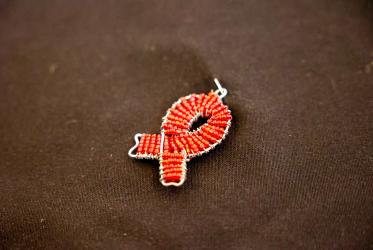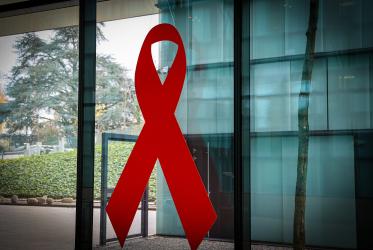Human rights have been identified and defended from various philosophical, religious and political perspectives, including individual liberal rights theory, natural law and moral theology, and theories of economic and social justice. Internationally recognized human rights have been drawn together and protected by such instruments as the Universal Declaration of Human Rights (1948) and the twin United Nations covenants - ratified by most governments - on economic, social and cultural rights, and on civil and political rights.
Over the last three decades the World Council of Churches has been actively involved in human rights standard-setting, promotion and protection. The last decade has witnessed a significant development of international norms and standards regarding people who are discriminated against on grounds of race, gender, ethnicity and religion. There are other kinds of discrimination as well, including that which arises out of lack of awareness and fear. Discrimination against people living with HIV/AIDS falls into this category. Such people are often denied their fundamental right to security, freedom of association, freedom of movement and adequate health care.
The violation of human rights in relation to HIV/AIDS is widespread. The pandemic spotlights many formerly unrecognized inequalities and prejudices in our societies and reinforces long-term disparities. People living with HIV/AIDS face isolation and discrimination in virtually all societies and cultures. Their physical symptoms are compounded by the psychological impacts associated with HIV/ AIDS. The illness and death resulting from HIV/AIDS is frequently suffered in loneliness and abandonment, as people with AIDS are often isolated and even abused. People who find themselves infected with HIV suffer the loss of their own future, whether by losing the opportunity to have a family, or being deprived of chances for meaningful work, or losing other basic human rights.
|
The attainment of a just and humane society requires that all individuals and organizations both respect human rights and dignity and observe those principles of humanity which reflect universal human values shared by religions and cultures throughout the world. Respect for the rights to life and to the highest attainable standard of health and for the principle of non-discrimination requires suites to ensure that all sectors of society receive appropriate information and education on HIV and AIDS, and that particular attention is paid to reaching people m remote locations and members of disadvantaged groups. From the "Declaration and Charter on HIV and AIDS" |
Definitions, obligations and limitations
This study has worked with a basic understanding of human rights as all rights necessary for integrity, survival, growth and dignity in relation to the physical, spiritual and social being. Human rights is thus not only about individual liberty, but also about economic and social justice, and 'the relationship between individual, community and the state.
The source of human rights is the recognition of the equal worth and dignity of all human beings. Affirming human rights is not just a matter of political activism; it is a worldview which has to do with how we perceive ourselves as human beings (whether as equals or not), how we relate to each other and our communities (whether in aggressive competition and prejudice or in love and mutual respect) and the role of leadership (whether paternalistic and dominating or aiming at empowerment and facilitating of autonomy).
|
HIV antibody tasting must occur with free and informed consent, except in the case of unlinked, anonymous epiderniological screening programmes. Segregation, isolation or quarantine of persons in prisons, schools, hospitals or elsewhere merely on the grounds of AIDS or HIV is unacceptable. From "the AIDS Charter", published by the |
In the context of HIV/AIDS, there is a strong public health rationale for respect of human rights. Such rights impose the moral and legal imperative to ensure that everyone's equal worth and dignity is fully respected, without discrimination.
There are of course different interpretations of and approaches to human rights. This is evident in the arguments for and against the "universality" of human rights - the idea that everyone everywhere is entitled to the same fundamental human rights regardless of cultural, political or religious differences. Those who argue in favour of universality say that all human beings share similar basic needs and at least some core human values, from which universal norms for human rights can be developed. Others would contend that, in the light of the different cultural characteristics and distinct values of societies, no single value system can be regarded as having global application. Some would even call human rights a "Western" notion being imposed on them against their will, though at the same time many people from the countries or communities where this argument is made are risking their lives to uphold these very rights - which they consider fundamental to their own cultures and faiths.
Despite these different interpretations, the dignity and equality of human beings have become accepted values. An important aspect of this is striking the proper balance between the rights of one individual and those of another individual or of the community. This may require limitations of the exercise of rights. Such limitations need to be provided for by law and strictly justified; they must not be arbitrary.
From the above, one may conclude that each right will have a corresponding duty. For example, because the exercise of one's own rights takes place within a social context, one is constrained to respect the rights (and, according to some, to help to meet the needs) of others. Rights involve also responsibilities, but the relationship between the two is complex, and the latter are often not discussed out of a fear that such discussion might compromise the principle of the inalienability of human rights - the conviction that individuals remain entitled to such rights even if they fail to comply with their responsibilities.
|
The duty of human solidarity requires everyone to cooperate in efforts to prevent and alleviate human suffering and strive against injustice. With respect to the protection of public health, international human rights jurisprudence and public health law and practice confirm that public health measures which restrict individual rights and liberties' are justifiable only to the extent that they are:
From the "Declaration and Charter on HIV and AIDS" |
The individual and the community
The complex relationship between rights and duties is confirmed by the status of human beings as created in the image of God. The Bible, rather than referring to "rights", speaks about duties to God within the covenant; this is in order to safeguard others from abuses and to give all people an equal possibility to benefit. God is described as love; and human beings, created in God's image, are therefore called and given the possibility to reflect that reality. The image of God is an inclusive description of the human family, not a cause for human pride. In light of this, humanity's very existence as love and koinonia should be approached according to the principles of relationships with others, including the natural world. Such an approach will in fact result in implementing the idea of human rights and duties.
For this reason, human rights also has to do with economic and social, environmental and ecological justice, and with the relationship between the individual, community and government. In saying this, however, it is important to be clear about the community's interests - and to identify who determines the nature of these. What is often put forward as the interest of the community may in fact be based on the selfish, individual interests of dominant "representatives" of the community.
In authentic koinonia , rights and duties are considered in harmony. The "individual", as usually described, does not prevail over the communitarian, but neither does the communitarian suppress the individual. From this theological perspective, the very idea of human rights can be looked at only in the light of life in community rather than against community.
There is consequently no necessary conflict between the rights of the person and the interests of the community. Human rights should be a tool for the empowerment of both persons and communities, in order to restore their dignity and enhance the quality of life.
Human rights vis-a-vis AIDS
The question of human rights in relation to HIV/AIDS is of course closely related to many of the ethical issues considered in the previous chapter; and this section, which focuses in particular on issues of justice, should be read in connection with that material.
1. Denial of human rights as a cause of vulnerability to HIV
At one point or another, all people affected by HIV and AIDS have their rights violated. But there is also growing evidence that people whose fundamental human rights are denied and who are economically or socially marginalized are especially vulnerable to the risk of HIV infection. AIDS follows the fault lines of our societies. Street children, those living in poverty, prisoners, commercial sex workers, drug-dependent persons, indigenous people and ethnic minorities are all at particular risk, and often show disproportionately high infection rates compared to the rest of their societies.
We have seen earlier (pp.13-18) that women are particularly vulnerable as a result of their disadvantaged economic, social and legal status. Lack of education, employment opportunities, independent income and adequate access to health-care facilities and treatment for sexually transmitted diseases all heighten the risk of HIV infection, as does lack of assertiveness in sexual matters.
A related and growing concern is violence against children. There has been an alarming rise in sex tourism, increasingly directed at partners who are children. And it is precisely in an effort to escape HIV infection that some men in both the North and the South abuse children and youth in an effort to escape infection.
2. The public health response
Protection of the right to life clearly requires states to take effective public health measures to control the spread of contagious disease. On this ground some people have suggested that it is permissible in the public interest to limit an individual's rights to liberty solely on the grounds of his or her HIV status. Fear and public ignorance surrounding AIDS have frequently led to public pressure for and even introduction of draconian policies to control the spread of HIV. Some AIDS laws and policies which have been introduced clearly violate fundamental human rights and ethical principles. In fact, there is no public health justification for limiting the individual liberty of persons living with AIDS, since HIV cannot be transferred through normal social contact.
3. Discrimination against people with HIV/AIDS or presumed to be at risk of infection
Perhaps the most widespread human rights abuses in the context of the AIDS pandemic are the discrimination and social stigma suffered by people with HIV/AIDS, their families and associates, and people considered to be at risk of infection, such as gay persons, prostitutes and drug users.
Sofia Gruskin speaks of the AIDS pandemic as sparking a new type of hate crime: "attacks on people because of an illness... AIDS-specific violence is just that: it generally involves reference to the disease. For some people, the fear of AIDS has provided a powerful, if misguided, rationalization for attacks on traditionally stigmatized groups, particularly gay men and female sex workers." [1]
The restoration of dignity
As indicated in the chapter on theological perspectives above (pp.43-44), any violation of human rights is contrary to Christian belief. Unfortunately, the reaction of many Christians and church members to HIV/AIDS has hardly been different from that of society in general - and sometimes has been even worse.
The HIV/AIDS pandemic calls attention to the importance of local heritage and tradition, as well as people-based knowledge and community processes. The challenge of the current situation is to recover and to reshape these crucial realities.
As they implement human rights while pursuing economic and social development, it is particularly important that communities participate in the light of their own experiences and values. The participation of people within the community is crucial. Because knowledge about human rights has implications for holding and using power, such knowledge should be available as a tool for the entire community. Similarly, the development and extension of human rights is something in which the entire community should be closely involved. The result should be a struggle for the holistic understanding and practice of human rights - a struggle in which the church plays an active role.
|
In the Participatory Action Research project in Kagoma , Uganda , the community started to discuss and address the issues of inequality and human rights within their local experience of HIV/AIDS. Through focus group discussions in the community, people realized that the underprivileged status of women was a problem for the whole community. Girls were deprived rights for education, which in turn made them vulnerable to sexual and economic exploitation, which could make them HIV-infected. Promoting education for girls was identified as a way of reducing the infection rate in that place. This was combined with enforcement of sanctions against rape. The groups also started to discuss traditional' male-female roles and division of, labour in the community, in order to propose changes and strategies to improve co-operation. From the 1993 report Participatory Action Research on AIDS |
Such a holistic view of human rights has not always been incorporated into people's understanding. In many struggles against injustice and oppression, people have been animated by secular understandings of human rights. Even people in the churches have fought for justice through agencies outside their churches.
The reality of HIV/AIDS existing in the individual, the community and the church creates a fresh opportunity for the church to be with its people - to leave the church buildings and to go and suffer with its people where they live. It is an opportunity for the church to reclaim as its own the struggle for the restoration of human rights.
The challenge to the church is: what is the extent of its role in advocating and protecting human rights in the context of HIV and AIDS? Some of the specific dimensions of that challenge are:
- to recognize that human rights are based on the equal worth and dignity of every human being;
- to consider that each individual and organ of society is under an obligation to respect the rights and dignity of others, to avoid harm and to act in compassion, tolerance and mutual solidarity; and that each has positive duties for the achievement of human well-being;
- to view human beings as whole - as physical, mental, psychological, spiritual and social beings. Such an approach requires recognition of the need of individuals to belong - to weave homes and communities. Thus the concept of community is an important element within a holistic understanding of human rights.
[1] Sofia Gruskin, "HIV/AIDS-Related Violence", in A Global Report: AIDS in the World , pp.562f., Box 13.4 .





